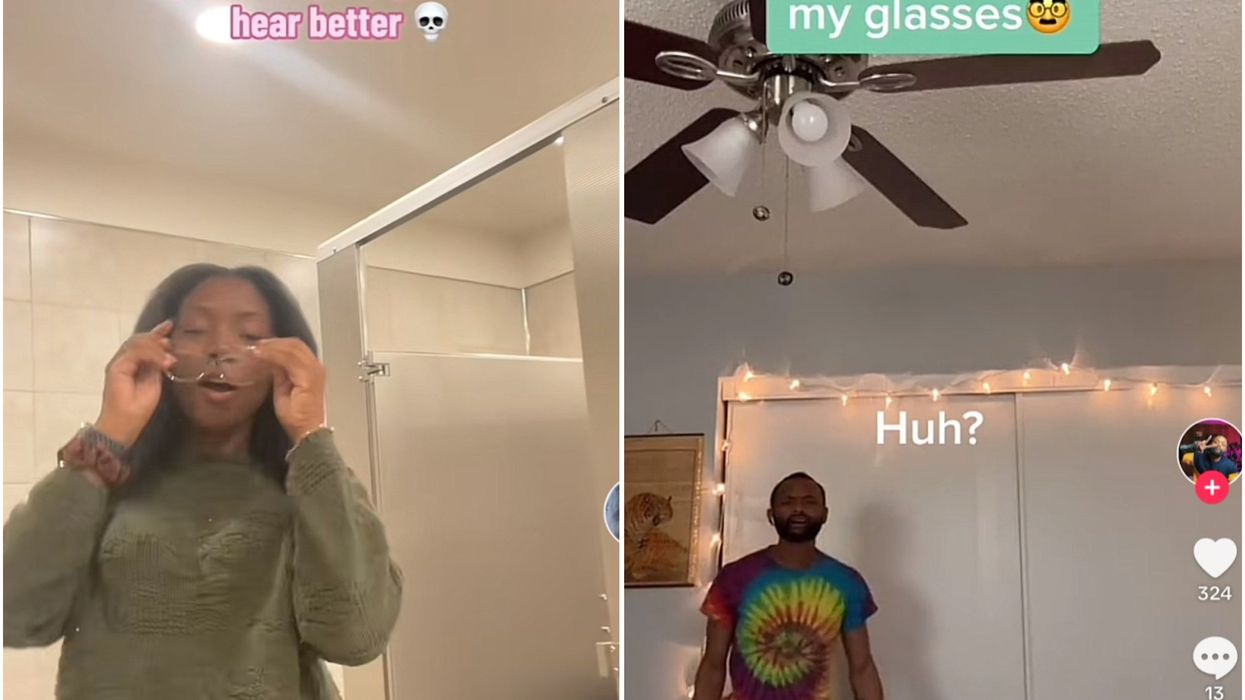Sinead Butler
Feb 20, 2024

Can’t hear without your glasses? An optician explains TikTok users' latest obsession
TikTok/It's Just Tori, Tyson Haze
Have you ever removed your glasses so you can “hear better” or turned your music down to “see better”?
TikTok users are convinced there’s a connection between seeing and hearing, and they wouldn’t be wrong, as one example people have been discussing is to do with wearing (or not wearing) glasses.
Some have claimed that taking off or putting on their glasses enhances their hearing, while similarly, others say although lowering the volume of your music might do more than protect your ears – it could also potentially improve your overall vision.
These videos have prompted viewers in the comments section to agree with this observation.
One person wrote: “I strongly believe there’s a connection between sight and hearing.”
“Same energy as turning the music down in the car so you can see the street signs better," another person said.
Someone else added: “YESSSS!! Everyone tells me that I’m crazy for saying I can’t hear without my glasses.”
@septembers_t Those who get it, get it 🤷🏾♀️ #saywhat #fyp #glasses #astigmatism means #icanthearyou #idontmaketherules #sweaterweather #HappyfirstdayofDecember #zennioptical #girlswithglases
So, what is the intricate relationship between our eyes and ears, and is it backed by science?
Malcolm Maciver, an optometrist at Leightons Opticians has explained why taking your glasses off seemingly helps you hear better and why reducing sound may help you see better.
Why can't you hear properly without your glasses on?
"While not 100% understood, the well-established connection between our eyes and ears is something that has been observed since antiquity," Maciver said.
He then mentioned a 2015 study published in Scientific Reports investigated the effect of gaze direction on hearing by assessing participants in a dark room, either looking directly at a speaker or looking away. It demonstrated that the brain uses more effort to process sound when individuals avert their gaze from the source.
Strikingly, participants exhibited slower reaction times and increased brain activity when their gaze was averted, suggesting a heightened cognitive effort in processing auditory stimuli.
@izzyesquivel Its the “go off, sis” for me 😎 #momsbelike #teenslang #momsoftiktok #millennial #genalphaparent #genalphaslang #daughtersbelike #makeup #beauty #beautytrends #beautycontentcreator #latinabeautycreator
"This study provides compelling evidence that our eyes and ears are not merely standalone sensory organs but are intricately linked. The brain assumes that what we see should match what we hear, and if there's any difference, it has to work harder to make sense of it," Maciver noted.
"This would explain why so many people find it difficult to hear when they’re not wearing glasses, whether they’re reading the lips of a person talking to them or unable to clearly see where the sound is coming from."
Recent research on ventriloquism sheds further light on the intricate relationship between our senses.
"Ventriloquism, the illusion where a voice appears to come from a puppet's moving mouth rather than the actual speaker, reveals how our brains integrate visual and auditory information."
Maciver referred to a 2019 study, where researchers recreated this confusion by showing participants things while playing sounds from different places.
"Findings indicated that our brains link the sound to where we see something, even if it's inaccurate, a phenomenon known as the ventriloquism effect."
He continued: "After being exposed to these mixed-up sights and sounds, our brains adjust how we locate sounds. So, even when we only hear something later, our brain still believes it's coming from where we saw something earlier.
"This further emphasises the interconnectedness of vision and hearing, highlighting that the brain relies on visual cues to process auditory information efficiently.”
Why might you hear better without your glasses on?
Maciver added: "On the contrary, the notion of taking off your glasses to hear better may also have some basis. As studies suggest a connection between vision and hearing, the act of removing glasses alone may not dramatically enhance auditory perception, but rather the overall collaboration of our senses that plays a crucial role in our perception.
"It's more about the overall coordination of sensory input. In other words, it's not just about one specific action, like removing glasses, but rather that removing your glasses allows the brain to focus on just one of the senses, in this case, hearing."
Can the reduction of noise improve vision?
On the claim that lowering auditory stimuli improves vision, Malcolm explained "In practical terms, reducing background noise and creating an environment conducive to both clear vision and effective hearing involves minimising distractions. This not only includes background noise but also how the sights and sounds match up both in terms of where they occur and when they happen.
"For example, turning the music down when driving can contribute to better focus and visual attention. Whilst the reduction in noise may not directly translate to improved visual sharpness, our vision can benefit from an environment with fewer distractions.
He concluded: "Ultimately, both vision and hearing benefit from an environment with fewer distractions. Whilst further research is required, it’s fair to say that our senses do collaborate, and there is clearly a symbiotic relationship between eyesight and hearing."
How to join the indy100's free WhatsApp channel
Sign up to our free Indy100 weekly newsletter
Have your say in our news democracy. Click the upvote icon at the top of the page to help raise this article through the indy100 rankings.
Top 100
The Conversation (0)













